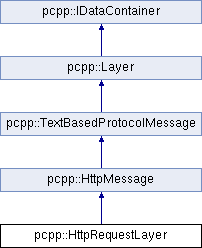|
| | HttpRequestLayer (uint8_t *data, size_t dataLen, Layer *prevLayer, Packet *packet) |
| |
| | HttpRequestLayer (HttpMethod method, const std::string &uri, HttpVersion version) |
| |
| | HttpRequestLayer (const HttpRequestLayer &other) |
| |
| HttpRequestLayer & | operator= (const HttpRequestLayer &other) |
| |
| HttpRequestFirstLine * | getFirstLine () const |
| |
| std::string | getUrl () const |
| |
| std::string | toString () const |
| |
| virtual HeaderField * | addField (const std::string &fieldName, const std::string &fieldValue) |
| |
| virtual HeaderField * | addField (const HeaderField &newField) |
| |
| virtual HeaderField * | insertField (HeaderField *prevField, const std::string &fieldName, const std::string &fieldValue) |
| |
| virtual HeaderField * | insertField (HeaderField *prevField, const HeaderField &newField) |
| |
| OsiModelLayer | getOsiModelLayer () const |
| |
| HeaderField * | getFieldByName (std::string fieldName, int index=0) const |
| |
| HeaderField * | getFirstField () const |
| |
| HeaderField * | getNextField (HeaderField *prevField) const |
| |
| int | getFieldCount () const |
| |
| HeaderField * | addEndOfHeader () |
| |
| virtual HeaderField * | insertField (std::string prevFieldName, const std::string &fieldName, const std::string &fieldValue) |
| |
| bool | removeField (HeaderField *fieldToRemove) |
| |
| bool | removeField (std::string fieldName, int index=0) |
| |
| bool | isHeaderComplete () const |
| |
| virtual void | parseNextLayer () |
| |
| size_t | getHeaderLen () const |
| |
| virtual void | computeCalculateFields () |
| |
| virtual | ~Layer () |
| |
| Layer * | getNextLayer () const |
| |
| Layer * | getPrevLayer () const |
| |
| ProtocolType | getProtocol () const |
| |
| uint8_t * | getData () const |
| |
| size_t | getDataLen () const |
| |
| uint8_t * | getLayerPayload () const |
| |
| size_t | getLayerPayloadSize () const |
| |
| bool | isAllocatedToPacket () const |
| |
| void | copyData (uint8_t *toArr) const |
| |
| uint8_t * | getDataPtr (size_t offset=0) const |
| |
Represents an HTTP request header and inherits all basic functionality of HttpMessage and TextBasedProtocolMessage. The functionality that is added for this class is the HTTP first line concept. An HTTP request has the following first line: GET /bla/blabla.asp HTTP/1.1 Since it's not an "ordinary" HTTP field, it requires a special treatment and gets a class of it's own: HttpRequestFirstLine. Unlike most L2-4 protocols, an HTTP request header can spread over more than 1 packet. PcapPlusPlus currently doesn't support a header that is spread over more than 1 packet so in such cases: 1) only the first packet will be parsed as HttpRequestLayer (the other packets won't be recognized as HttpRequestLayer) and 2) the HTTP header for the first packet won't be complete (as it continues in the following packets), this why PcapPlusPlus can indicate that HTTP request header is complete or not(doesn't end with "\r\n\r\n" or "\n\n") using HttpMessage::isHeaderComplete()

 Public Member Functions inherited from pcpp::Layer
Public Member Functions inherited from pcpp::Layer